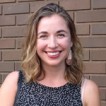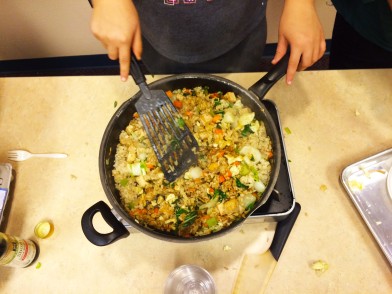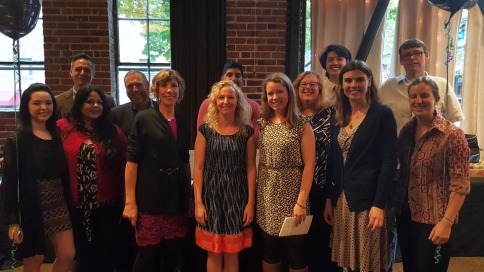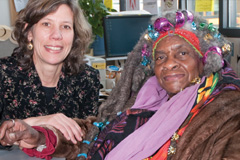
Kayla Blau, author
This post was authored by Kayla Blau, Children’s Advocate with Solid Ground’s Broadview Shelter & Transitional Housing. It originally appeared in The Seattle Globalist and is reprinted with their permission.
We’ve all been there. Enjoying a family dinner and great-aunt Sally makes a snide remark about “Mexicans taking our jobs.”
Not wanting to make waves at a family gathering, my typical pattern would be to let it slide and stay silent. I’d roll my eyes and text my “conscious” friend about the experience, leaving the comments hanging triumphantly in the air.
And what had my silence done? Absolutely nothing but perpetuate the racist culture I claimed to want to dismantle.
Now, I know what you’re thinking. Great-aunt Sally is just old and ignorant! But every racist joke, comment, dynamic, or law that goes unchecked, especially by white people, reinforces and perpetuates a racist society. It normalizes racism. It becomes accepted and expected. It gives the illusion that racism ended with the signing of the Civil Rights Act, when people of color are still being targeted and murdered by the police.
While overt racism appears to have lessened in the past 50 years, it is still extremely active and deep-rooted in our society’s psyche.
It usually freaks other white people out when I use the term “white supremacy” to explain how our society accepts racism, but it simply puts a name to the oppressive structure that means, for example, that we don’t have to fear being shot while walking in the dark wearing a hoody, while others do.
After learning the brutal reality of racism and privilege, white folk (myself included) often lament, “what can I do? I can’t accept these injustices…what can I do about them?”
This is literally it: Talking to other white folks about race, and, more specifically about whiteness, is one concrete way to undo racism as a white person. Unlike at a black-led march — this is where our white voices are needed.
Conversations with loved ones are tough. It is something I continue to struggle with in my own family and friends.
But we must push through discomfort to talk about race, even with great-aunt Sally, even when it feels completely unproductive and frustrating.
I mean honestly, people of color have enough to worry about to talk to a defensive white person about race. It can be extremely re-traumatizing for a person of color to have to justify their oppression to a white person, and it really is not their responsibility to do so.
Whether we like it or not, white people created racial oppression, therefore white people need to be part of the movement to undo it.
After much trial and error, here are a few tips about how to talk about race with other white people, drawn from my experiences of talking to my white family and friends, learning from other anti-racist white people, and advice from mentors of diverse backgrounds:
Educate Yourself First
Because white people are so uncomfortable with naming and discussing race, conversations can easily become argumentative or defensive.
The hope is to avoid calling the person you’re talking to racist and storming out (been there). I’ve found it helpful to educate myself about the real racial history of our country (spoiler alert: there was a genocide here, not a corn-filled dinner party), reflect on my own connection to whiteness and racism, and remove judgment of other’s understanding of race and privilege.
If we were raised and socialized in the U.S., we have all been receiving unconscious (and sometimes blatant) messages about white superiority and negative stereotypes about people of color since birth.
While it’s easy to dismiss other white folk as racist or bigoted, it is unfair to negate our responsibility to view every conversation about race as an opportunity to educate and learn, while processing the extremely complex emotions that come with it.
When I first started talking to my 62-year-old Jewish father about race, I would often leave the conversation feeling deflated and frustrated. When I told him Native Americans were mass murdered, he would respond with doubt and denial.
It wasn’t until we visited an indigenous peoples museum with facts of ethnic cleansing (over 90,000 indigenous people were murdered by white settlers) and displacement (hundreds more died on the Trail of Tears after false treaties were signed) that he began to open his eyes to the deception of the white narrative of U.S history.
Only then could we begin to have honest conversations about our country’s patterns of genocide, displacement, and racial oppression. Because he responds more to fact and logic than emotion and storytelling, the wall of white fragility was broken.
That being said, the more educated you are, the better equipped you’ll be in having discussions based in fact and analysis, rather than defensiveness and judgment. Plus, exposing yourself to the racial history that was not taught to us in school will only deepen your own understanding, allowing linkages to be made between your own family history and racism (which is difficult but necessary work in itself).
If you are personally connected to the person you’re talking to, try to tailor your approach to engage them in difficult conversations based on their personality and what would resonate with them (i.e., documentaries, intersectionality to other forms of oppression, mixed-media, art, scientific reasoning, etc.).
With all the accessibility of resources, we must educate ourselves and our community if we truly want to work for change.
Use Non-Violent Communication Skills
During an incredibly insightful event, “Dear White Allies: A Training,” put on by Black Lives Matter DMV, participants were urged to use non-violent communication skills to do effective racial justice work in white communities. Too often white people shut down due to discomfort during conversations about white supremacy, and claim to be victims when called out on our privilege.
One way to use non-violent communication skills to remediate this is “connect before you correct,” meaning, make a human connection with someone before calling them in on their ignorance.
For example, instead of leading with, “you ignorant asshole, ‘black man’ is not synonymous with thug,” try leading with, “I hear you saying that black men are all criminals. Why do you think that is?” And continue the conversation to tease out their perceptions and stereotypes based on media portrayal, for instance.
Meet ignorance with compassion. I’m not advocating coddling white people, nor lessening the message to make white people less uncomfortable. The message should still be loud and clear, but altering the way it is messaged can be extremely useful in impact. I’ve found people respond to and learn from compassion and self-reflection, and shut down when met with judgment.
In a very frustrating conversation with a co-worker about Israel and Palestine, he continuously justified Israeli occupation with “how violent Islam is.”
My knee-jerk reaction was to call him ignorant and walk away (which I did). My other co-workers shared our frustrations with him among one another for a few weeks, but never really addressed it with him.
It wasn’t until I heard him share his sentiments with a Muslim student that I realized my comfort level was less important than any damage he could do with our students. I asked him to elaborate on where his perception of Islam came from. He thought for a moment, and uncovered the truth that his only interaction with Islam was what he’d heard after 9/11.
Taking advantage of a teaching moment, my other co-workers and I researched the 5 Pillars of Islam with him and the impact of occupation on Palestinians. While this wasn’t a magic wand for years of prejudice, at the very least he began to question his assumptions.
Calling someone ignorant and walking away doesn’t necessarily have the same effect.
Make it Personal
During a particularly challenging conversation with my dad about the Confederate flag and the nine lives lost in Charleston, it seemed like nothing was getting through to him about the weight of such a racist attack.
“Just to play devil’s advocate,” he ventured, as he often plays during our conversations about race, “isn’t the flag part of the South’s history? What’s the big deal?”
After a few failed attempts at reasoning with him, I asked him how he would feel if he saw the Swastika on bumper stickers and street corners, let alone at his state’s capitol, knowing that his father was a victim in the Holocaust.
He immediately understood, as if the window to empathy was locked somewhere in his own connotation of oppression.
While no two oppressions are the same, by linking his own history to symbols of oppression his awareness was heightened. Others have used their experiences with homophobia, sexism, or other intersectional identities to relate to oppression as a system, thus allowing space to recognize our role as beneficiaries of racism through our whiteness.
Take the Time, Do the Work
Whatever you do, keep the conversation going. Invite your friends and family members to conversation groups, movie screenings, black-led events, and community forums about racial justice to keep them looped in and accountable. Share articles and novels written by people of color. Attend undoing racism trainings. Interrupt negative stereotypes of people of color in the media by offering holistic narratives. Urge friends and family to listen to people of color when they recount their experiences. Continue processing, talking, and organizing your community.
It is all too easy to slip into the apathetic and numb existence of whiteness, to not feel connected to racism because we benefit from it.
We are at a critical tipping point in history, thanks to the media and accessibility of information. White people are beginning to “wake up.” We can’t afford to let this movement pass by without engaging our white community and supporting POC-led movements against racism and oppression.
To be sure, having one conversation about race will not solve racism. We’re looking at 400+ years of racial oppression, genocide, and violence, and unpacking the painful and visceral implications of white supremacy will take time and work and commitment.
It will be messy and frustrating and liberating but, above all, necessary to undo racism.
Filed under: Undoing Racism & Oppressions | Tagged: Black Lives Matter, community building, racial justice, Undoing Racism, white allies, white people | 1 Comment »































